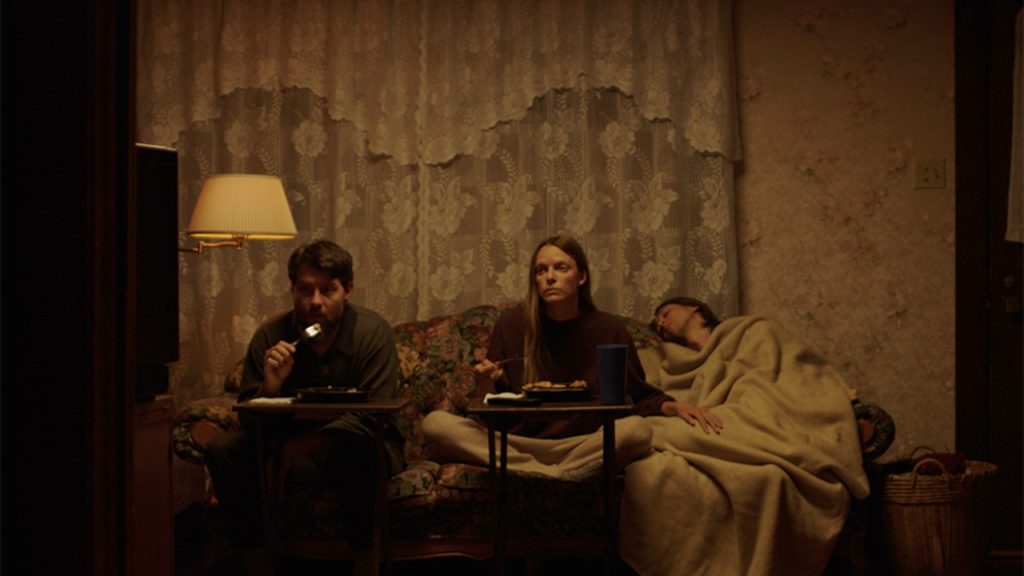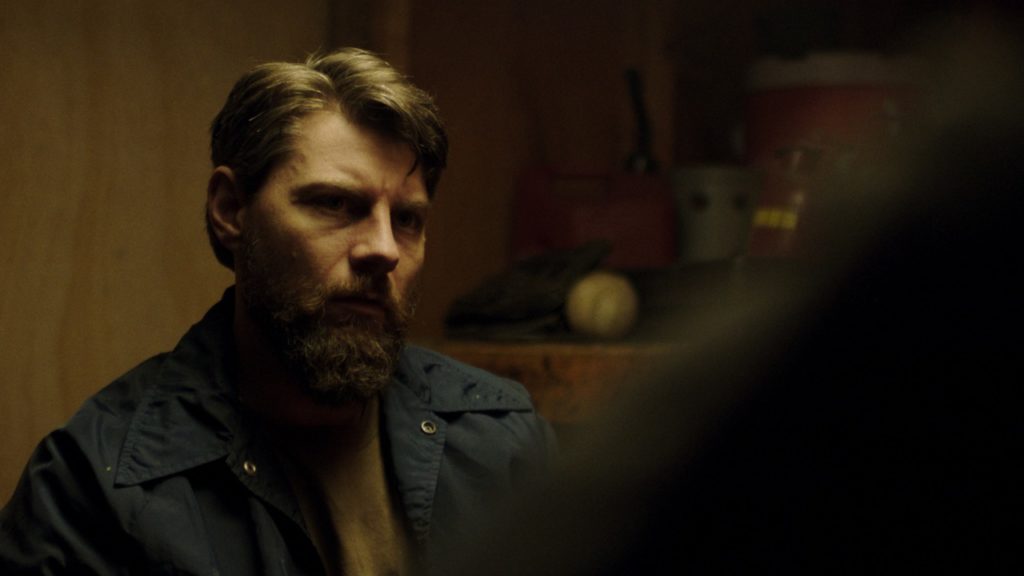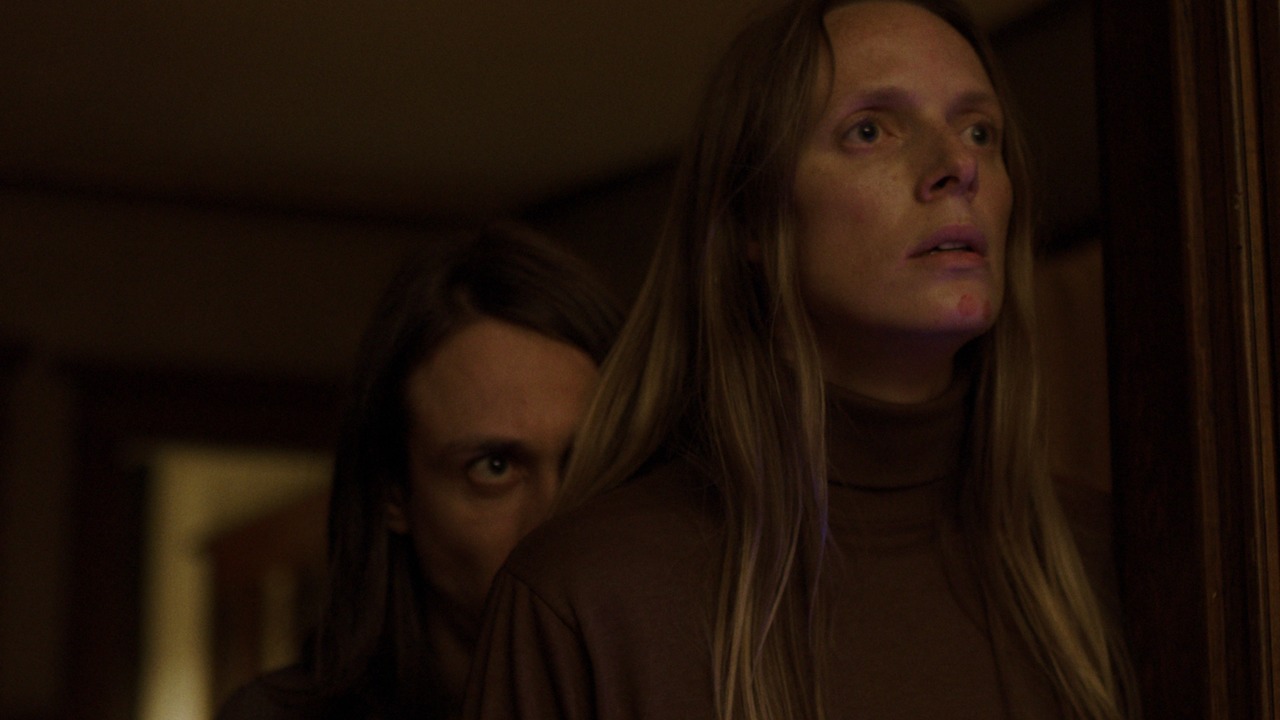
My Heart Can’t Beat Unless You Tell It To (2020) was quite rightly described to the waiting festival audience as ‘sombre’. This is a tale of a family unit isolated by extraordinary circumstances, in several ways reminiscent of We Are What We Are (2013), with the same carefully-considered gaps in the narrative, never handing the audience a full, perfect explanation of events. And, just like that earlier film, it’s all incredibly involving and engrossing. However, as sombre as it is, My Heart…isn’t a colourless, or emotionally flat film. It has its moments of happiness and vindication, as well as moments of high action. It’s a carefully-realised piece of work altogether, one which makes you care deeply about its characters and their fates.
Siblings Dwight (Patrick Fugit), Jessie (Ingrid Sophie Schram) and Thomas (Owen Campbell) are all at various stages of adulthood, with Dwight the apparent de facto head of the household, and Thomas – as the youngest – still very much being looked after by his big brother and sister. But there’s far more to it: on a regular basis, Dwight has to go out, dupe and then deliver people – the kinds of people whom no one would miss – back to the threadbare homestead. There, Dwight and Jessie collaborate to drain them of their blood, blood which is used to feed their ‘sick’ younger brother.
Why? This is one of the compelling omissions in the narrative. It isn’t made clear if there’s a supernatural, or some kind of physiological explanation for Thomas’s ailment. The illness, as it’s referred to, simply is what it is, and the older two have to deal with it. Dwight, however, clearly finds the whole process repellent. Jessie rationalises it in a phenomenally cold manner, but she’s not without warmth outside of this extraordinary circumstance, often demonstrating love and devotion for her family which – almost – balances her utilitarian cruelty. This intense pressure upon both of the older siblings is storing up future conflict, though, with each of them having ideas about a life beyond the confines of the family in some way, shape or form. When Dwight is found to be making vague plans to go somewhere, do something with an outsider, Jessie is quick to take steps. From her perspective, she cannot cope with Thomas and his needs on her own, and relies on Dwight. Yet her behaviour is deliberately malevolent, and the domestic situation soon deteriorates. Thomas, too, wants a life outside his four walls, and fantasises about friendships.

The thing about these three is that they prove the old adage, ‘you can’t choose your family’, only they take it to a grotesque extreme – though without shedding the very real, very poignant emotional responses to their predicament. Each of them is in their own way lonely, feeling the effects of isolation. Jessie, perhaps most of all, seems resigned to her lot – but then, her emotional state manifests itself in other ways, and her behaviour becomes more desperate and erratic as she senses the jeopardy she is in. The most tragic thing about this film is in how each of them attempt to get to know other people, and it’s an urge which has to be abandoned. Their behaviour is monstrous: by deliberately targeting the most vulnerable, they are simply rationalising the irrational. But are they monsters? I would argue not. Their sadness and introspection indicates that there’s more to them, and that they have become used to such a horrific way of life out of sheer necessity, even if events are by this point conspiring to enforce a change. A sense of impending doom hangs over the entire plot, but the worse it gets, the more humanised the characters become.
It’s quite fitting that this film has appeared during a time of such complete isolation for many people out in the real world, and no doubt some aspects of it will chime differently for people who have had to spend their own enforced time at home, but it would work as effectively at any time. My Heart Can’t Beat Unless You Tell It To is an unflinching look at the lengths people will go to for family ties, but it’s also a story about loneliness, a story which you know is going to collapse in on itself at some point. The presence of some minor glimpses of light are a surprise, but certainly deserved – though without changing the fundamentally dour dynamics here. Superb, subtle performances underpin the whole, with a special nod to Patrick Fugit as Dwight – your heart could break for him, honestly. This is an accomplished first feature from Jonathan Cuartas, and another of this year’s great examples of the emotional depths genre cinema can reach.
My Heart Can’t Beat Unless You Tell It To (2020) screened at the Celluloid Screams Horror Festival in Sheffield, England.
